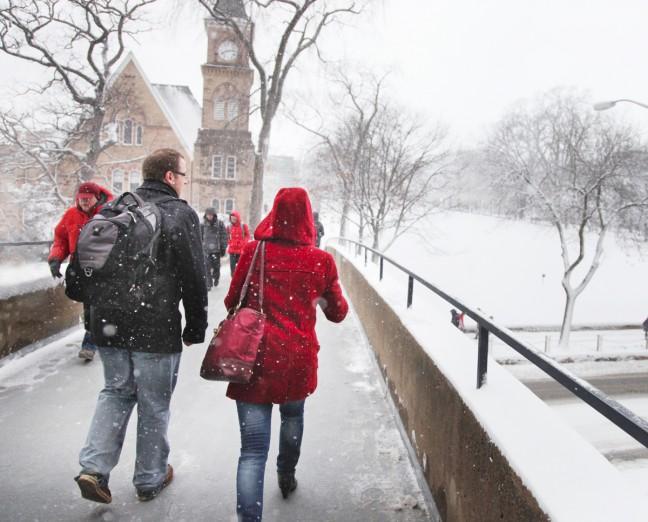Editor’s note: Debunked is a science news series that focuses on dismantling common myths and misconceptions with the help of UW experts.
Post-winter break is one of the peaks of flu season, but the freezing February weather is not to blame for the increase in coughing and sneezing around campus.
Professor in the Biochemistry Department Ann Palmenberg said cold temperatures do not directly cause illness but they do provide ideal conditions for virus transmission.
“In the winter, lots of viruses are very happy, especially respiratory viruses, because the cold keeps them from degrading in the environment,” Palmenberg said. “So droplets, which are the major way in which almost all respiratory viruses are spread, are obviously more stable.”
Palmenberg said the effects of the cold weather on the body, like chapped noses, increase viral transmission. When the immune system repairs chapped skin, it increases the production of a receptor called ICAM-1, the main receptor of rhinovirus.
UW researchers developing new rapid, more accurate COVID-19 test
Viruses also spread more easily when people stay inside, as they can survive for hours on common household surfaces like doorknobs, desks and tables. So, unfortunately for those who love staying inside under the covers all winter, avoiding the cold weather is not a good way to stave off illness.
“When you’re inside and in close contact, you’re swapping [viruses],” Palmenberg said. So there’s a lot of increased contact by virtue of being indoors in winter.”
As for preventing the winter sniffles, Vice Chair of Research in the Department of Pediatrics Dr. James Gern gave a few tips on how to combat winter illness in an email to The Badger Herald.
“Factors that are associated with increased susceptibility to viruses include high stress levels and not enough sleep,” Gern said. “In addition, a healthy diet is likely to help.”
Vitamins C and D especially are important for a healthy diet to bolster the immune system, according to Gern.
So, instead of hibernating this winter, make sure to spend some time outside, get some sleep and eat a well-rounded diet to stay healthy.


















